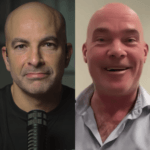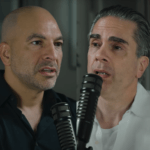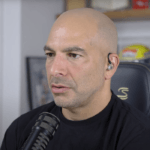Check out more content from Marty Makary, M.D.:
- (Aug 26, 2019) #68 – The US healthcare system — why it’s broken, steps to fix it, and how to protect yourself
- (Jan 3, 2022) #189 – COVID Part 1: Current state of affairs, Omicron, and a search for the end game
- (Jan 24, 2022) #192 – COVID Part 2: Masks, long COVID, boosters, mandates, treatments, and more
In this episode, Marty Makary, Johns Hopkins surgeon and NYT bestselling author, discusses his new book, The Price We Pay, and his ambitious attempt to fix the broken U.S. healthcare system through educating the public, changing the lexicon, encouraging radical transparency in pricing, and more. We go in detail into the main drivers of inflated health care costs, the money games being played making it hard to understand, and the unfortunate system structure that has resulted in one in five Americans finding themselves in medical debt collections which can ruin the lives of people and families seeking basic medical care. Marty also shares some very practical advice and tips if you find yourself a victim of predatory pricing and stuck with an outrageous medical bill. In the end, despite the current state of the system, Marty discusses the many exciting trends gaining traction in healthcare and why he is very optimistic and hopeful about the future.
Subscribe on: APPLE PODCASTS | RSS | GOOGLE | OVERCAST | STITCHER
*This episode of The Drive centers around the content of Marty’s new book, The Price We Pay, which is set to release September 10, 2019. If you’d like to dive deeper into this topic, Marty’s new book will be a great resource.*
We discuss:
- The science of delivering healthcare, how we need to do better as a system, and why no single person or entity fully to blame [10:15];
- The stories that prompted Marty to write his first book (Unaccountable) [19:15];
- The Surgery Checklist [26:15];
- The problem is with the system (not any one person or entity) and the misaligned interests of all the parties involved [28:15];
- Patients crave honesty and transparency, and the story of Peter’s back surgery gone wrong [33:00];
- Today’s med students and young doctors have less tolerance for predatory pricing and healthcare industry BS [44:30];
- Funny stories about John Cameron (legendary surgeon at Johns Hopkins) [48:00];
- How doctors are trained to internalize traumatic experiences which can result in a misunderstood form of “burnout” [57:40];
- The beat down of med students with traditional medical education and some exciting innovations to medical education [1:07:00];
- Exciting trends in healthcare and an optimistic view of the future [1:11:30];
- The Price We Pay (Marty’s new book), an attempt to illuminate the blackbox that is the US healthcare system [1:21:00];
- Why it’s not always in the best interest of the insurance company to negotiate the best price [1:28:30];
- Who is actually paying for medical costs, and Marty’s frustration with the healthcare lexicon [1:32:00];
- Pros and cons of a single payer system [1:37:00];
- How to fight outrageous medical bills and predatory pricing (and make a dent in the wasteful healthcare spending for the country) [1:49:30];
- Disrupting the healthcare industry with private healthcare facilities with market demanded transparency [2:05:45];
- The people hurt the worst by the current US healthcare system, the sad breast cancer statistic, and the importance of knowing that medical bills are negotiable [2:09:30];
- The healthcare industry bubble [2:14:00];
- Increased costs from unnecessary tests and procedures [2:16:30];
- Malpractice concerns due to the litigious culture in America: What influence does it have on unnecessary testing, healthcare costs, and overall quality of treatment [2:22:00];
- Drug pricing, price gouging, middle-men money games, kickbacks, and other drivers of healthcare costs [2:27:45];
- How can we possibly fix the healthcare system? [2:34:30];
- Helpful resources [2:46:15]; and
- More.
The science of delivering healthcare, how we need to do better as a system, and why no single person or entity fully to blame [10:15]
Marty’s first book: Unaccountable: What Hospitals Won’t Tell You and How Transparency Can Revolutionize Health Care
*This has been made into a popular show on Fox called The Resident
What prompted you to write Unaccountable?
- “Unaccountable to me was an opportunity to … engage the general public in a way that both brings honor to medicine and at the same time warns people that it’s important to get a second opinion. It’s important to ask certain questions.”
The science of delivering healthcare
- During med school, Marty realized that there was a whole science around the actual delivery of medical care (patient safety, avoiding mistakes, etc.)
- Marty says discussion on policy is detached from the real world inside the trauma center (for example)
A system problem
- Marty tells a story about a broken elevator in a hospital
- A person walked into the open doors and fell to his death
- For some reason, they still didn’t put up a barrier
- Shortly after that, another person fell again (but did not die)
- Other examples include
- Broken elevator button to the emergency helicopter pad
- Person at the x-ray counter refusing to give you x-rays because of some policy they made up
- These stories and others prompted Marty to realize we have a system problem
- “It made me think about systems, hospital systems, redesigning the delivery of care. And I think all of those questions naturally open up the question of how can we do better, how do we not harm people?”
We need to change the lexicon in medicine
Doctors can’t take all the blame
- Marty says that doctors (understandably) get defensive when they hear the term “medical mistake”
- Doctors work their tail off to get through school and then to get blamed for “mistakes” that in many cases are more of a systems issue
- Marty says it’s important we change the lexicon
- Instead of “medical mistake”
- We should say “medical care gone wrong” which is a more of a patient term
The lexicon in medicine
- When you say “health care costs” it sounds nebulous
- But the price of health care has gotten out of control
- Medicine has a way of creating its own lexicon to “sterilize” everything (i.e., “preventable adverse event” to describe a death that didn’t need to happen)
“So one of the things I’ve tried to do, at least with the platform that I’ve been given for my surgical career at Hopkins is say, “How can we change lexicon? How can we look at the systems and the delivery of care? How can we make sure somebody’s in charge of the overall ship?”
The less absurd errors are far more scary
- The open elevator shaft story is egregious but far less common
- Peter says the scarier part is the less absurd errors that happen even at the best of institutions
- In residency at Hopkins, Peter remembers the weight of the responsibility he was given when he was very inexperienced
- And at the same time he has the “complete trust” and “absolute faith” of patients
- Marty tells a story about how he stuck a patient over 20 times trying to get an IV in because he was afraid of his chief resident walking in and saying “Why doesn’t this patient have a central line?”
- But that’s how med school is… you have to learn over time and by making mistakes
The stories that prompted Marty to write his first book (Unaccountable) [19:15]
Marty was seeing “mind-boggling” things he was seeing as a med student and resident
{end of show notes preview}

Martin Makary M.D., M.P.H.
New York Times bestselling author
Johns Hopkins surgeon and Professor of Health Policy
Dr. Makary is the NYT bestselling author of The Price We Pay, a new book that breaks down the high cost of health care and shows how people can get a better deal on their health care. The book has been described as “a must-read for every American and business leader” by Steve Forbes and a “deep dive into the real issues driving up the price of health care” by Dr. Don Berwick. Makary is a frequent medical commentator on NBC and FOX News and a leading voice for physicians, writing for the Wall Street Journal and USA Today.
Dr. Makary has been elected to the National Academy of Medicine and named one of America’s 20 most influential people in health care by Health Leaders magazine. His current research focuses on the appropriateness of medical care, drug prices, and the impact of the health care cost crisis on low-income populations. Dr. Makary was the lead author the Surgical Checklist and later served in leadership with Atul Gawande on the World Health Organization Surgery Checklist project. Makary has published more than 250 scientific articles, including articles on health care transparency, vulnerable populations, and guidelines for prescribing opioids. As a gastrointestinal surgeon, he is also an advocate for healthy food and lifestyle medicine.
His last book, Unaccountable, was adapted for television into the hit medical series The Resident. His newest book, The Price We Pay, tells the stories of health care’s disruptive innovators and the new movement to restore medicine to its mission.
Photography by: ©Michael B. Lloyd






https://youtu.be/ZLkGIzSEbUc
This lecture from 1985 will explain why we are in the mess we are in now
What is the name of the drug price app mentioned in the podcast?
Here you go: https://www.goodrx.com/mobile
Single payer is just an insurance product. The problem is the use of insurance products – wholesale – in healthcare. Insurance can only be used, successfully, for probability based businesses (weather.. fire.. etc). Emergency urgent care is probability based area of care and is a candidate for insurance. Persistent illness is not a probability, except in rare cases, and, in fact, the use of “insurance”, is likely contributing to burgeoning health issues. People don’t – by chance – end up with diabetes. They’ve developed it over time. Early and often testing and health intervention helps counter these trends. The irony is that, today, people are paying far more in insurance premiums, than it costs to get the care they need – and they’re also not getting the care, because it’s just “insurance”. And then.. it’s too late.. they’re irreversibly ill. The talk of “universal care” is a criminal offense when you take this into account. You can bundle business models, but you can’t use the same one universally.
This was a great podcast. Even the NYT’s is getting the message: https://www.nytimes.com/2019/09/03/health/carlsbad-hospital-lawsuits-medical-debt.html?te=1&nl=science-times&emc=edit_sc_20190903?campaign_id=34&instance_id=12084&segment_id=16678&user_id=4f9aa2f9ab9e25862880982bf8835187®i_id=88361940
My son sold spine hardware for 2 years in San Antonio. He had to quit to save his sanity. He saw a less than 50% improvement rate from surgery, poor neurosurgeons making over 1 million dollars a year, fraud to the point of enriching the surgeon’s girlfriend by ordering hardware under Medicare, breaking the seal and tossing the package, as well as told by a neurosurgeon I went to school with to “bring your checkbook”. The still extant practice of P.O.D., (physician owned devices) is a little known secret that has a large agency issue leading to many more surgeries. These are all opaque to the general public yet result in massive upcharges to the “care” one receives.
A lot of the lessons learned from and before the financial crises can be used to eliminate a great portion of this waste.
1.Insurance companies should be mandated to have fiduciary responsibility for their clients. This would help restrict the IC ability to generate more revenue by over paying for procedures/drugs.
2. All medical procedures and prices billed should be published on a public electronic exchange on the day they are billed. Any excessive mark up with in the same practice would be fineable as a form of price discrimination.
3. All insurance programs should be available on an exchange and could be purchased for limited time or lifetime.Discounts would be available for certain health markers but not bulk.
4. Employers of a certain size would be required to cover 50-70% of costs.
Just heard Dr. Makary’s interview on Public radio. Can’t wait to read the book. I agree that the basic problem is the underlying incentives. Our system in the USA is fraught with perverse incentives among three parties: the “provider,” the “patient,” and the “payer” insurance company. These forces must be understood if we are to deal with the healthcare crisis in this country.
For another take on this, read my commentary on “What don’t we get about healthcare in this country?”
https://geverest.umn.edu/home/papers-and-publications/healthcare
I have to mention one more thing. Kaiser is a membership model, not a capitation model (fixed price insurance model). The membership model is a profit center and takes advantage of the profit incentive for the benefit of the patient. Capitation models suffer the problems that many complain about – specifically, denial of and withering access to care (not just of payment). Kaiser and Intermountain are membership models. I fear the capitation model will suffer the same fate it did in the 90s and we’ll never get to the reform that is needed. I’ve worked at Kaiser and I can tell you healthcare is a gross profiteering business. Kaiser made $3B in profit in the first quarter of 2019. Don’t misinterpret. That doesn’t make Kaiser wrong. That makes the insurance model wrong.
Fascinating podcast, thanks so much for talking ad lib about your times as residents. Took me back to med school 45 yrs ago. We had our own living legends and hero-worship was quite normal.
Having worked in three different systems over my life I may have a slightly different perspective on the costs and why they are so different here in America. We outspend every other nation in the world on healthcare and yet are far behind our contemporaries in the developed world when it comes to a formal measure of our nation’s health. I have no doubt in my mind that the best healthcare is available to me right here in New York where I live, but how many Americans have access to it? I am not sure how much has changed from 1990 when the NEJM reported that black men in Harlem had a lower life-expectancy than men in Bangla Desh (NEJM 1990;322:173-7). Contrary to expectations, the leading killer was not homicide.
To borrow from Stephen King’s ‘Dark Tower’, I believe the health train in the US is being driven by three engines which seemingly are out of anyone’s control: 1. People’s expectations, 2. Malpractice laws (as they exist today) and 3. Fee for Service practice of medicine. These overlap significantly and when combined, are a deadly force that is taking us towards a precipice and there seems to be no way to stop it.
From my own experience of working in the US system for about 30 yrs, I honestly believe we Americans need to have a serious conversation with ourselves. At what point does the health of one individual become more important than that of an entire society? How does keeping a 100 year old woman with advanced Alzheimer’s alive on a ventilator, with gastric tube feeding help anybody, far less the poor woman who is not even conscious any more? How do you justify suing a pathologist for causing the death of a patient when all she did was an autopsy on a patient that was already dead? How do you pour 40 units of blood into a gunshot victim involved in a drug deal gone bad? How can we keep an illegal alien in the hospital for over a year because once admitted he cannot be discharged since he claimed he had ‘no way to get his tube feeds’? These are real world examples from my own experience, I am sure Peter and others have similar stories to tell. We all know the one from Florida a few years ago.
Marty does mention that malpractice is only a small cost of healthcare, perhaps if you only consider the premiums and lawsuits it may be. But when combined with the demands of the patient, the fear of litigation (CYA) or simply the inertia involved in fighting the now ingrained expectations in society, the overall cost is probably a lot more. How does one compute the cost of defensive tests, procedures and prescriptions anyway? In the centenarian on a ventilator example above, all three engines are at play: Family wants and expects grandma to be kept alive; there is great reluctance to advise otherwise – because you cannot ever say it costs too much or is ‘not indicated’, would have a lawsuit in an instant; every entity involved in the care of the person is making money in the process – ‘fee for service’ is in action. And so, the ghastly scenario continues. Nobody stops to think if the poor woman could only see herself in this state, would she really want it?
The problem is, there is no easy way to reduce health care costs without rationing of some sort and we Americans hate the R word. In a capitated (NHS, UK) or ‘Member’ (Kaiser) system one has to trust the physician enough to believe that if he says you do not need a colonoscopy you really do not need one and he is not saying it to avoid the work involved – because he does not get any extra pay for doing it. In a ‘fee for service’ model, if the physician says you need a colonoscopy is he saying this because you really need it or because he makes extra money doing it? There are plenty of examples of egregious behavior on both sides of this debate.
The only way forward would be for us as a society to recognize that healthcare with all the modern technology and treatment at our disposal is expensive and cannot be used with the ‘limitless supply’ model in mind. The question is who determines when the limit is reached?
From my limited perspective, what I would love to see is a patient and not his insurance card. All too often care is provided based on the card in his wallet not his symptoms or the disease he is suffering from.
There is one very important topic that was not touched at all. Manufacturers of vaccines, doctors and their offices can not be held responsible for injuries caused by vaccines, due to the National Childhood Vaccine Injury Act (NCVIA) of 1986.
You have a slightly misleading view of UK healthcare. Our doctors are not civil servants.
The general practitioners, i.e. doctors outside hospitals are mostly independent practitioners who are paid an annual fee per patient on their list.
You’re right about healthcare spending being cut back but in the UK it went up almost all the time from about 1948 to 2010, by about 4% per year in real terms. Since then that it has gone up about 0.5-1%/y, not as fast as it needs to do.
Increased ‘marketisation’ of the NHS, forced on it by Conservative governments, has actually increased costs. This is partly why there is currently so much dissatisfaction with services. I assume that the Swedish or Canadian systems are more successful than ours at securing funding increases above inflation.
I’d much rather have the UK, Swedish or Canadian system than what you have. So would a few people I know who live in the USA.
If you in the USA want a more hybrid system, you’d be better off looking at what happens in countries like Switzerland or France, which are really just government-regulated private insurance systems and the hospitals are private or charitable. The French health service costs more than the UK system, though, because there is a vast amount of extra form-filling.
David, as an American, I agree with your comment. I occasionally have almost visceral objections to what Peter is saying, and his monologue comparing the Canadian and US health care systems was one of them. What he said was, paraphrased, the US health care for the rich is better than their health care for everyone. One, I’m not even sure if *that’s* true; and two – enough said (just be rich, y’all).